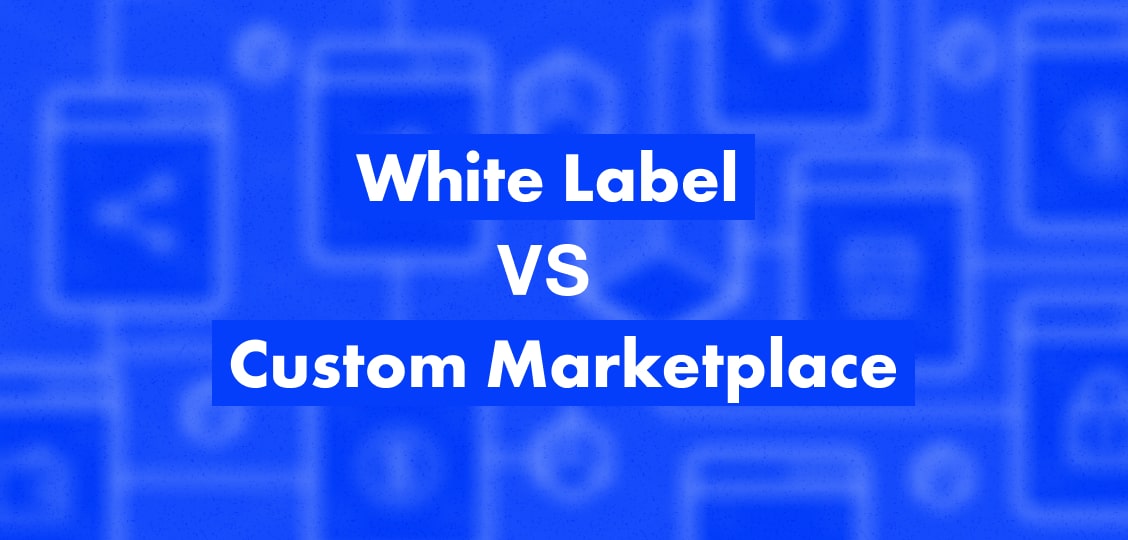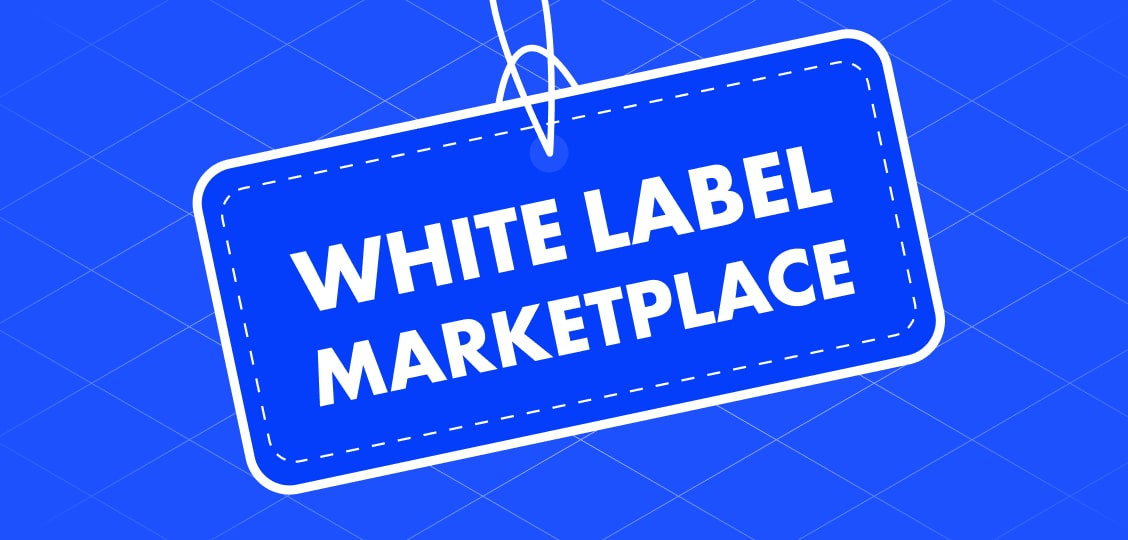What is a white label marketplace platform? Top 4 benefits for your business
Find out how white label marketplace development will allow you to improve time to market, reduce expenses, and increase customer loyalty.

The demand for online marketplaces is seeing rapid growth across various sectors, including e-commerce, hospitality, healthcare and education. Marketplace applications enable vendors to launch their business and reach the audience in the fastest way possible, avoiding the necessity to build their own software. Marketplace owners, in turn, generate revenue through monetization , which may involve transaction commissions, listing fees, advertising, and subscription to premium features.
However, custom marketplace development is a time-consuming and resourceful process that encompasses multiple stages, such as user interface (UI) / experience (UX) design, programming, testing, and deployment. Depending on project size and complexity, a client should have a budget of at least $40,000 but in some cases, it can be more than $500,000. In turn, software product development usually takes between 3.5 and 12 months.
As a result, many organizations are looking to reduce costs and time to market (TTM) while preserving end software quality. Representing off-the-shelf solutions, white label marketplace apps can address these challenges. Nevertheless, they still have some limitations you should be aware of when choosing between turnkey and tailor-made software.
In this article, we will compare custom and white label marketplaces, describing their advantages and disadvantages. Our software experts will also consider the best use cases for each approach. Continue reading to learn which model will better suit your goals.
A white label marketplace is a platform developed by a third party for further rebranding and reuse by other companies. While a solution provider earns income from reselling an online marketplace, organizations just tailor it to their business style and objectives.
For example, a variety of white label marketplace apps have embedded functionality to move design elements, place logos, modify colors, as well as change text size and fonts. Thanks to this, enterprises can rebrand a digital marketplace in just a few days.
Other marketplace vendors, involving Arateg , customize a white label solution for each client individually, which allows for achieving the highest level of personalization. Apart from the user interface, our software engineers implement new features based on project requirements. With a white-labeling strategy in force, firms and institutions do not have to build, test, and deploy a digital marketplace platform on their own, this way saving time and costs.
When choosing a custom approach, a company turns to software experts (designers, developers, quality assurance engineers, a business analyst, and a project manager) to create an online marketplace platform from scratch. From analyzing client requirements to testing and debugging, the team is responsible for the entire project life cycle.
By applying this model, enterprises can tailor the marketplace to any business-specific needs, making the product stand out from competitors, which is quite challenging with white labeling. To build a custom marketplace, an organization can recruit in-house employees or freelancers.
Marketplace development outsourcing is another option that should be considered. By hiring an IT outsourcing partner, it is possible to significantly cut down expenses while getting access to a pool of talents worldwide. To learn more about the benefits of marketplace development outsourcing, read this article on the topic.
With a white-label marketplace platform, an organization saves time and costs, so it can realign budgets in a more effective way, investing more resources in solution advertising. By focusing on marketplace app promotion, a company will be able to attract the necessary number of customers and merchants much faster, resulting in higher profits and ROI.
If a company decides to purchase a white label marketplace app, it avoids the need to control the process of product implementation. To build a custom marketplace platform from scratch, an enterprise has to not only hire an IT partner but assign in-house professionals to communicate with the team, monitor progress, discuss various issues, or alternatively manage the project on its own.
When creating a tailor-made marketplace, it is crucial to analyze the outcome of each software development stage and provide feedback. Additionally, an organization should get a clear understanding of how a software engineering firm manages projects, which covers activities such as work scope estimation, task distribution between experts, and reporting. By using a white label approach, you do not have to spend time and effort on project management, thereby saving time and effort.
The possibility to tailor a digital marketplace platform even to the most business-specific requirements is among the primary benefits of custom development. As a rule, white label marketplaces are standard solutions that can serve multiple sectors.
White label marketplace applications have basic functionality that generally involves:
However, brands and institutions may need to implement a lot more features to engage users and address their pain points. With the view to increase customer satisfaction , an enterprise can integrate an artificial intelligence-based chatbot, make personalized recommendations, provide one-click ordering, and develop a loyalty program.
On top of that, companies often have their own domain specifics. For instance, it is essential to integrate e-commerce marketplaces with inventory, warehouse, and order management systems for automating workflows, raising efficiency, and minimizing errors.
Healthcare marketplaces have to deliver online appointment scheduling and audio/video conferencing functionality but it is possible to offer a variety of other things to gain a competitive advantage.
Well, white label marketplaces allow for customizing the user interface but all the while companies that purchase the app have the same placement of their brand elements. Basically, organizations can modify certain design components such as colors, logos, and text size but no more. As a consequence, it is challenging to make solution design stand out from rivals, especially when operating in a highly competitive landscape. In this case, a marketplace may look quite similar to other online platforms.
If a digital marketplace platform has to store and process sensitive information (e.g., user names, addresses, contacts, payment details), it is crucial to provide the highest level of data privacy. What’s more, organizations that operate in certain domains have to ensure compliance with various standards, for example, General Data Protection Regulation (GDPR) or Payment Card Industry Data Security Standard (PCI DSS).
Basic security functionality of a marketplace contains two-factor authentication and role-based data access control but white label solutions usually do not offer these features at all. On top of that, a company may need to ensure stronger protection against cybersecurity threats, for instance, implement data encryption, biometrics, system monitoring powered by AI, and more. Therefore, custom marketplace development definitely wins in this case.
When choosing a white label marketplace platform, introducing new functionality and upgrades is a complex task. In order to make changes to the system, an organization has to communicate its requirements to an online marketplace provider that has a direct access to the source code. Then, the provider identifies whether it can deliver new features or not as it can host many applications with the same source code.
However, it is much easier to scale a custom marketplace, since it is tailored to client business-specific needs. As the source code owner, the company can also migrate to new technologies or modify solution architecture (for instance, create a new microservice) independently from a third party.
Custom marketplace development and white labeling both have their own strong and weak sides. To identify which option will perfectly suit your business, it is important to determine the project objectives, formulate requirements, and estimate budgets (for app development, maintenance, and marketing).
If you aim to launch a marketplace as soon as possible while reducing expenses, you should consider purchasing a white label solution. In case you do not have to build a software product tailored to specific needs, white labeling will also be a great way to enter the market.
However, when you have sufficient resources and strive to gain the audience’s recognition, you should create a custom marketplace. This approach will especially fit your goals when having to implement a lot more features and integrations than provided by white label marketplaces.
If you want to buy a white label marketplace app or make a custom platform, contact our team. We will get back to you within 1 working day and help address all issues. Project consultation is free of charge.

Find out how white label marketplace development will allow you to improve time to market, reduce expenses, and increase customer loyalty.

Find out what healthcare technology trends will drive the market this year and learn how you can address domain challenges by using advanced software solutions.
Now, you will receive a fresh newsletter from us.
Get the latest scoop on software application tips, announcements, and updates from us. Subscribe to our newsletter!